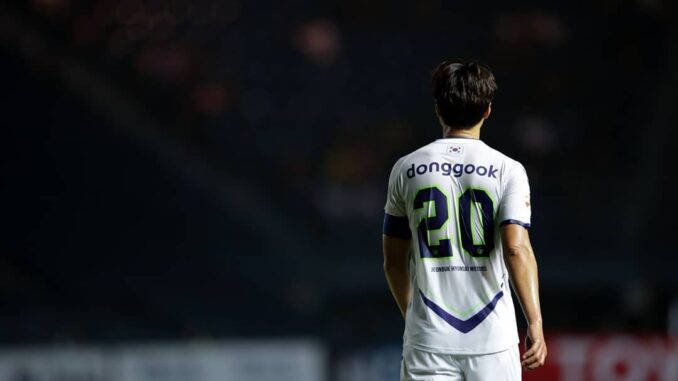
“I was in Korea but I did not watch a single World Cup game. Instead, I drank a lot of alcohol in an attempt to numb the pain.”
Lee Dong-gook’s career, and life, could have taken a very different turn after the very public embarrassment of missing out on the squad for the 2002 FIFA World Cup.
It was a bitter pill to swallow for the then 23-year-old, who had been celebrated as the next superstar of Korean football in the preceding four years since making his World Cup debut in 1998 as a fresh-faced 19-year-old.
His was a star on the rise – K League Young Player of the Year in 1998, the same year he finished top scorer and MVP at the AFC U19 Championships, as well as winning the Golden Boot at the 2000 AFC Asian Cup with six goals, despite playing large parts of the tournament clearly injured with a heavily bandaged right knee.
It was those injuries that curtailed a loan spell with Bundesliga side Werder Bremen after just seven matches. But the 2002 World Cup, on home soil no less, a true once-in-a-lifetime opportunity, should’ve been his stage, the time he truly announced himself on the international stage.
Instead, it was a very public fall from grace as he was surprisingly overlooked by Guus Hiddink, with the Dutch maestro claiming he didn’t have the speed or agility required.
“Many Korean fans thought that I should have been in the squad in 2002 and so did I,” Lee said in an interview with the-AFC.com in 2016.
“In hindsight, that was the one big reason why I shouldn’t have been called up. I tried well but I was so arrogant and I failed to get into the squad. I talked a lot to the Korean media and wandered from place to place. I was shocked by the decision and started to hate football.
Embed from Getty ImagesHis omission, and explanation from Hiddink as to the reasons why, earned him the nickname ‘Lazy Genius’ from the unrelenting Korean fans.
“That label has long been a stigma for Lee,” Korean football journalist Steve Han told The Asian Game.
“I think his personal debacle from missing the 2002 World Cup has now almost turned into a part of his story that helped him remain motivated to prove that he’s not as mentally weak as he was once made out to be.”
While his career could’ve gone off the rails, Lee credits his omission, and subsequent time completing his mandatory military service, as the turning point in his career and life.
“I got called up to national service (in 2003) and Lee Dong-gook’s second life began,” he explained.
“I got mentally strong and humbler and to this day, I think I would not be where I am if I had made the World Cup squad in 2002. Before that, I leaned on my natural talent and ability but then I realised how much hard work it took to make it at a professional level and started to redouble my efforts.”
Despite that awakening, however, the setbacks kept coming and in arguably more devastating fashion.
Having reshaped and rejuvenated his career, he was in career best form leading up to the 2006 FIFA World Cup, scoring 12 goals in 25 games for the national team under Dick Advocaat across 2004 and 2005, including another four at the 2004 AFC Asian Cup.
His redemption story was almost complete, but life threw another curve-ball his way. Just one month before Advocaat was due to name his World Cup squad, Lee picked up a knee injury while playing in the K League for Pohang Steelers.
Scans revealed torn cruciate ligaments which required surgery and a lengthy spell on the sidelines.
Embed from Getty Images“There was some genuine sympathy amongst fans in Korea when he missed the 2006 World Cup with a serious knee injury,” Han explained.
“He was at the pinnacle of his career from 2004 to 2006 and was dominant in the K League leading up to the World Cup.
“Lee himself has told the Korean media in the past that he worked so hard during those years for the World Cup in 2006 so that he could erase the memory of missing 2002, so much so that he wouldn’t want to repeat the kind of training regime he went through.”
A failed move to the Premier League with Middlebrough followed, a move that still invites ridicule from sections of the UK media to this day. But according to former teammate and Korean legend Lee Young-pyo, he was never afforded a true opportunity to show off his talent in the UK.
“I do not believe he received all the chances he needed,” the former Tottenham defender told The Asian Game. “If he had more opportunities, he would’ve been successful at Middlesbrough.
“At that time there were some coaches who tend to judge Asian players too quickly without looking at their ability more carefully.”
Those challenging experiences have moulded Lee into the man he is today, a far cry from the “arrogant” kid he admits to being at the turn of the century.
“He’s actually a really great guy,” explained Australian international Alex Wilkinson, who played with Lee at Jeonbuk from 2012 to 2015.
“When I first got over to Korea obviously I didn’t speak much of the language, and a lot of the players at the club didn’t speak a lot of English, but Dong-gook was one that, because of his time overseas and his time spent in England, he actually spoke some decent English.
“So he was really great for me to have within the change room, he made me feel really welcome and took me out for dinner a few times.”
Now married to Lee Soo-jin, a former Miss Korea runner up, and a father of five children, including two sets of twin daughters, he has his appearance on one of Korea’s most popular reality TV shows – ‘The Return of Superman’ – to thank for his new-found popularity with the Korean public.
“There’s no doubt that he’s widely considered as one of the fan favorites in Korean football,” Han commented. “Although there will always be some of those who will question him for failing to create that ‘landmark moment’ in the World Cup.
“Nevertheless, most football fans in Korea realise just how impressive his longevity has been, and even many of those who doubted him during his younger days have gradually developed a strong respect for him.
“I also think that his long-lasting appearance on the Korean TV show The Return of Superman has helped him to connect with fans at a human level.
“It’s a show that is televised nationwide on one of Korea’s major networks and it gave a chance for the general public to get an inside look at Lee’s personal life with his five children. I think people were genuinely impressed that he continues to perform at a high level on the pitch considering his age, whilst balancing that with his personal life with such a big family.”
While his appearance on the popular show may have softened him image in the eyes of the public, on the field he remains as fierce a competitor as ever. Despite his age (41) he wont even countenance the thought of retirement, and when he continues to deliver year after year, why should he?
“I still believe my overall performance on the pitch is still competitive enough to compete at this level,” he told The Asian Game last year.
“I never thought that I would be able to play for such a long time, so I am challenging myself to see until when I can play as professional footballer.”
While he is still delivering on the pitch, and finding the back of the net with such regularity – he scored nine goals last season, which was only bettered by Ricardo Lopes (11) and Moon Seon-min (10), both of whom have since left the club – he should continue playing, according to Lee Young-pyo.
“There are several reasons why (he continues to play), but most importantly I think that his scoring record is better than the younger players,” Lee, capped 127 times for Korea, explained.
“He is still scoring many goals for the team right now, plus he is the moral support and a role model for his teammates, which makes him very important for the team.”
His mere presence, be it in the starting eleven or coming off the bench, makes a difference for Jeonbuk. He carries an aura about him, according to Wilkinson, that worries opposition defenders.
“There’s no doubt that defenders in the league are intimidated by him,” Wilkinson said.
“He’s got a definite aura about him in the K League because of his record and because of what he’s done for the national team. He’s highly, highly respected.”
It’s a respect that has been hard earned, having turned his life and career around from the turbulence and setbacks of those early years when he could quite easily have become just another promising youngster with unfulfilled potential.
Korea has produced some of Asia’s finest players over the last few decades – the likes of Cha Bum-kun, Park Ji-sung and Son Heung-min – and while Lee may not have the European success of those names, there can be no doubt that when he finally calls time on his career, whenever that may be, he will sit comfortably alongside them as a true legend of Korean football.

